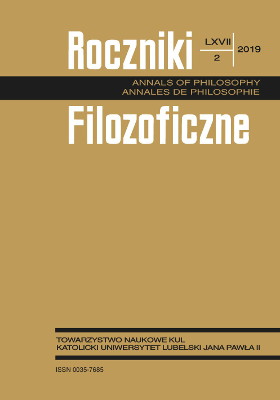Evaluative and Existential Aspects of Moral Luck
Abstract
The phenomenon of luck poses a problem for ethics for two reasons. First, it makes it difficult to formulate homogeneous moral judgments for two or more actions which seem to be similar to each other in every morally relevant aspect except of some successful or unfortunate events that take place in one case and not in the other. The occurrence of these events wasn’t under control of any of the agents but for external observers it tends to be the basis for more rigorous or more tolerant moral judgment in one case and not in the other. Second, luck can affect our sense of life through success or failure of ours existentially important life projects. This fact suggests necessity of conditions for morally permissible relying on luck in formulating and pursuing one’s life project. In this paper I present possibilities of applying main views on luck to resolve the above problems.
References
Ambegaokar, Vinay. 1996. Reasoning About Luck: Probability and Its Uses in Physics. Cambridge: Cambridge University Press.
Bewersdorff, Jörg. 2005. Luck, Logic, and White Lies: The Mathematics of Games. Wellesley, Mass.: A. K. Peters.
Coffman, E.J. 2015. Luck: Its Nature and Significance for Human Knowledge and Agency. Houndmills, Basingstoke, Hampshire, New York, NY: Palgrave Macmillan.
Dias, Fernando M.V., Hugo A. Cano-Prais, Sérgio Kehdy i Antônio L. Teixeira, „A Pathological Gambler by Dostoyevsky”. Revista de Psiquiatria do Rio Grande do Sul 30, 2: 236–240. DOI: 10.1590/S0101-81082008000400013.
Domsky, Darren. 2004. “There is no door: Finally Solving the Problem of Moral Luck”. The Journal of Philosophy 101, 9: 445–464. DOI: 10.5840/jphil2004101930.
Dostojewski, Fiodor. 1992 [1867]. Gracz. Przełożył Władysław Broniewski. Warszawa: Wydawnictwo Puls.
Driver, Julia. 2013. „Luck and Fortune in Moral Evaluation”. W: Contrastivism in Philosophy. Red. Martijn Blaauw, 154–173. London: Routledge.
Fletcher, George P. 1996. Basic Concepts of Legal Thought. New York, Oxford: Oxford University Press.
Frankfurt, Harry. 1969. „Alternate Possibilities and Moral Responsibility”. The Journal of Philosophy 66, 23: 829-839.
Hales, Steven D., i Jennifer A. Johnson. 2015. Luck Attribtutions and Cognitive Bias. W: The Philosophy of Luck, red. Duncan Pritchard i Lee John Whittington, 59–77. Chichester, West Sussex, UK: Wiley Blackwell.
Juzaszek, Maciej. 2014. „Między trafem moralnym [moral luck] a trafem prawnym [legal luck]”. Diametros 41: 56-76. DOI: 10.13153/diam.41.2014.577.
Lackey, Jennifer. 2008. „What Luck Is Not”. Australasian Journal of Philosophy 86, 2: 255–67. DOI: 10.1080/00048400801886207.
Latus, Andrew. 2003. „Constitutive Luck”. Metaphilosophy 34, 4: 460–75. DOI: 10.1111/1467-9973.00285.
Levy, Neil. 2011. Hard Luck: How Luck Undermines Free Will and Moral Responsibility. Oxford: Oxford University Press.
Mann, Karl, Mira Fauth‐Bühler, Susumu Higuchi, Marc N. Potenza i John B. Saunders. 2016. „Pathological Gambling: A Behavioral Addiction.” World Psychiatry 15: 297–298.
Nagel, Thomas. 1993. Moral Luck. W: Moral Luck, red. Daniel Statman, 57–71. Albany: State University of New York Press.
Pritchard, Duncan. 2005. Epistemic Luck. Oxford: Oxford University Press.
Rescher, Nicholas. 1995. Luck: The Brilliant Randomness of Everyday Life. New York: Farrar, Straus and Giroux.
Riggs, Wayne. 2009. Luck, Knowledge, and Control. W: Epistemic Value, red. Adrian Haddock, Alan Millar i Duncan Pritchard, 204–221. Oxford, New York: Oxford University Press.
Singer, Peter. 2016. The Most Good You Can Do: How Effective Altruism Is Changing Ideas about Living Ethically. Melbourne, Vic.: The Text Publishing Company.
Steglich-Petersen, Asbjørn. 2010. „Luck as an Epistemic Notion”. Synthese 176, 3: 361–77. DOI: 10.1007/s11229-009-9569-x.
Stoutenburg, Gregory. 2015. „The Epistemic Analysis of Luck”. Episteme 12, 3: 319–334. DOI: https://doi.org/10.1017/epi.2014.35.
Teigen, Karl H. 2005. „When a Small Difference Makes a Large Difference: Counterfactual Thinking and Luck”. W: The Psychology of Counterfactual Thinking, red. David R. Mandel, Denis J. Hilton i Patrizia Catellani, 129–146. London: Routledge.
Wallace, R. Jay. 2012. „Justification, Regret and Moral Complaint: Looking Forward and Looking Backward on (and in) Human Life”. W: Luck, Value and Commitment: themes from the ethics of Bernard Williams, red. Ulrike Heuer i Gerald Lang, 163–192. Oxford: Oxford University Press.
Whittington, Lee John. 2015. „Getting Moral Luck Right”. W: The Philosophy of Luck, red. Duncan Pritchard i Lee John Whittington, 205–218. Chichester, West Sussex, UK: Wiley Blackwell.
Williams, Bernard. 1993. „Moral Luck”, W: Moral Luck: Philosophical Papers, red. Bernard Williams, 20–39. Cambridge: Cambridge University Press.
Copyright (c) 2019 Roczniki Filozoficzne

This work is licensed under a Creative Commons Attribution-NonCommercial-NoDerivatives 4.0 International License.





